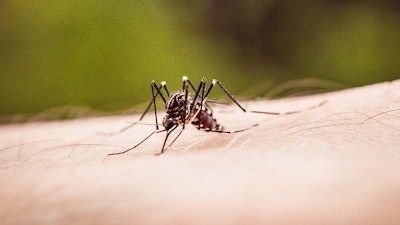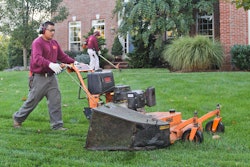
Without any statistical data to back it up, the number one vacation destination for consumers in 2020 was likely their backyards.
“Before, when people were working at the office all day long, while they did want to enjoy the outside as much, the back and forth to the office limited the time you could spend there,” says Chris Lemcke, Mosquito Hero technical director. “We’re definitely seeing that with more people working at home they do definitely want to enjoy being outside if they have that opportunity to do it.”
To further that, many consumers have invested a lot of money turning their backyards into those destinations.
“If you’ve got this beautiful backyard, you’ve sunk a lot of money in for landscaping and for entertaining purposes there’s nothing worse than not being able to use it because the bugs are eating you alive and they’re just harassing you left and right.” says Mark Wilson, CEO of Tick Killz. “This is why a lot more people have now become more focused on treating their property, because they’re spending, and their kids and their pets may be spending more time outdoors.”
In the US, an average of approximately 10,000 mosquito borne disease occurrences are reported annually, whereas, tick-borne disease affects as many as 400,000 people a year.
Ticks are on the rise in the US due to climate change, and other factors. The milder winters and warmer springs improves tick survival and results in faster population growth and increase the potential for the transfer of tick-borne disease.
“You have a lot of people getting affected every year, the number of cases are going up due to factors from milder winters to the way we build new housing developments that are bringing more people into contact with ticks,” says Allegra Lowitt, general manager, Professional and Tick Divisions, Thermacell Repellents, Inc. “I think there’s an enormous potential for professionals to help protect people.”
For a green industry professional, looking to increase their revenue, mosquito/tick control is certainly a great opportunity, because it’s been growing in double digits for a while. To some degree, the Zika virus in 2016 made consumers more aware of mosquito borne diseases just as Lyme disease has made people more aware of tick-borne diseases.
“The industry has grown a lot and consumers are just more aware that there are professionals who can treat their yard for pests,” Lowitt says. “In general, people are not protecting their backyards sufficiently from ticks, and the professional is in an important position to help educate the homeowner and protect them and their family from ticks nad diseases they care that affect over 400,000 people a year.”
While consumers can DIY tick and mosquito control, the recommendation is to seek out a landscape professional who knows your yard and understands intimately how to handle mosquito and tick control.
Wilson notes that the beauty of the lawn care or landscape professional is they’ve already got a list of core customers that they’ve been working with for a long time.
“To me the successful people are those who put together a simple little email burst or flyer that goes out with your seasonal billing,” Wilson says. “You do the advertising, and you do the awareness upfront to let people know that you’re now offering a tick and order mosquito control program and right off the bat you probably picked up just from your existing customer base a lot of interested people. Then of course you can also expand that into very simple marketing techniques like email blasts of certain kinds out to the general marketing public.”
“You really want to offer it because it’s an extremely profitable service to add to your business,” Wilson says. “We know there’s a lot of things that are a part of lawn care that you have to do but may not be as profitable as some of the things that you might want to do to grow your business. We strongly advocate that everyone should be offering it where possible, because it just makes business sense.”
Like lawn care, for mosquito and tick control, nearly every state has different requirements for mosquito biting fly licenses.
“It’s not as easy as buying a piece of equipment and going out and started to treat, you have to have all your documents in order to be able to do this,” Lemcke says.
For lawn care in most states, a business license is required. In most states, to operate and go out and apply chemicals, at least one person must be tested at the state level and then workers can be employed underneath that person. Lemcke says a similar rule applies for the mosquito biting fly licenses. However, in some states, the owner and anyone completing applications must be certified.
Once you are beyond the certification, the general start-up costs for mosquito application tends to be less than lawn care when talking about equipment.
What about equipment
Wilson says the cost of materials for adding mosquito and tick control as a service is very minimal. In addition, cost of labor is also low. Typically, a lawn care or lawn maintenance company already has a crew visiting a property on a regular basis anyway, so it’s just the cost of entry.
Application can be accomplished in several ways, all the way down to one of those hand pump sprayers that many homeowners have. However, you wouldn’t want to use that unless you’re treating a very small property.
For most professionals, as low end as they want to go would be a backpack sprayer. On the high end is a the 300-gallon tank sprayers, dragging a hose through the property to apply the product. Among the most popular applications are the mist blowers, which are backpack blowers with attached tanks on the top with a tube that connects to the wand to allow product to drip in from the tank. The liquid is dispersed in a fine mist from the tank through the blower.
Lemcke says Mosquito Hero has a few backpack sprayer models that are approved for use by franchisees but the Makita unit is favored due to the lack of mixed gas and the way the product is held more centered over the back versus above your head. He admits the packs are heavy and it’s helpful to have a system set-up to fill it and still have it high enough so you’re not having to lift it up to put it on your back. “You need somewhere to have it held and be able to put it on easily,” he says.
“One of the big issues in adding a new service is labor,” Lowitt says. “If your technicians have excess time in their monthly schedule, adding tick and mosquito service can be a good option.”
Control, not elimination
Ticks and mosquitoes are similar in the sense that you want to understand the customer’s property.
Unfortunately, for a newcomer to mosquito and tick control, as with lawn care, each property is slightly different in its makeup, so the application process will vary slightly. Also, it is important to note that when we talk about mosquito control, we talk about control, not elimination.
Lawn care and mosquito and tick control don’t necessarily go together when talking application.
“When we think about tick and mosquito control, we separate them just to make sure that we make this specific point that most tick control applications are done every four to six weeks,” Wilson says.
For good mosquito control, he suggests every three to four weeks, due to the rapid life cycle and airborne nature of the mosquitos. Once the first application is complete, the amount of product utilized per visit is reduced.
“The real process behind it is that mosquitoes feed on nectar when they’re not feeding on humans,” Lemcke says. The blowers are used to mist the product underneath the leaves where the mosquitoes are during the daytime.
“Basically, as you’re creating this area where the mosquitoes don’t like to congregate now because you’ve put this product in there,” Lemcke says.
The consensus when defining mosquito control, is that it tends to be more perimeter-based. However, any free-standing water on the property can serve as a breeding ground.
Similarly, ticks thrive in leaf litter, mulch and other damp, moist places around the yard. Additional considerations include fences or if a property backs up to a wooded area without a fence, allowing deer access.
“For a professional, there are a variety of techniques,” Lowitt says.
The difference between ticks and mosquitoes is that in season, a new batch of mosquitoes can be born very quickly, with high periods of activity occurring as temperatures warm from the mid-70s into the 80s.
Conversely, ticks are on a two-year life cycle. Once you understand the typical life cycle, you understand when they’re likely to feed, which creates a schedule of certain high activity periods.
A lot of the products crossover between lawn care and mosquito treatment. Products utilized to treat insect on lawns, such as Talstar, which would be a 30-day application with a more immediate knockdown.
“There are some newer products that we encourage and want most of our franchisees using,” Lemcke says. “What we like about the deltamethrin products is that they’re very stabilized, they last longer, they’re UV protected, and they’re extremely safe.”
Most of the offerings are in the pyrethroid family.
“It’s not magic potion, everyone’s got similar products,” Lemcke says.
Tick Killz is among the organic-based products available on the market.
“It’s safe for not only the applicator, but it’s safe for the homeowners, it’s safe for the children, it’s safe for the pets, it’s safe for the environment,” Wilson says. “You’re not concerned about runoff like you are with other chemicals that are used on given properties. We hit the high points in terms of the safety profile yet, we’re still very effective in doing what we want to do, which is rid a property of ticks and mosquitos.”
Obviously, at the end of the day, a lot of this stuff comes down to just service and being respondent to the customers.
“An integrated pest management system program is the best plan of attack for ticks,” Lowitt says. “You need to be able to treat the yard and the key hose animals bringing ticks into the yard to provide the best results. Additionally, IPM programs with multiple tools and targeted approaches are particularly helpful as regulatory rules change, limiting the use of certain pesticide products, setbacks and frequency of application.”
She says Tick Control Tubes are a good complement to sprays and can increase the effectiveness of the service plan because they kill the ticks that are feeding on mice, the key host animal. “Even after using a spray, studies have shown that there are a significant number of ticks that remain on mice because they’re down in their burrows or beyond the range of the spray.”
How much to charge?
“With what you can charge for the spray service, the margins are kind of astronomical,” Wilson says.
Having spent money on patio furniture, backyard lights or mosquito or tick control, consumers will recognize that they’re spending a lot of time in their yard and want to be able to feel like it’s a safe place for them and their family to relax.
“Depending on the the size of the yard, for a cost of $3 to $4 a day, the homeowner can hire a professional to treat their yard for less than their daily coffee at Starbucks,” Lowitt says. “It’s an affordable price that allows the homeowner to enjoy their backyard and make the most of their summer.”
Wilson says he’s had professionals come to him and say that they would like to walk away from the traditional landscape services, get more trucks and build up the spray business because it’s easier and more profitable.
“It’s something that really increases a family’s enjoyment for the summer and is affordable for many families,” Lowitt adds.
“We wouldn’t be doing it or offering if it wasn’t beneficial, not just beneficial for the nuisance, and being able to enjoy the outdoors but the benefit there’s a health benefits to protecting your family,” Lemcke says.
Wilson agrees. “It’s not just about enjoying the environment, it’s that safety element as well,” he says. From his perspective, it’s a “win” if they can help prevent one, five, 10 or 100 people from getting some disease from a tick or mosquito.
“You just don’t want to be bitten by the wrong tick or the wrong mosquito, it’s that simple,” Wilson says. “For a contractor, in my mind, it just makes sense even just to offer this service, even if you don’t turn it into your total focus because I think you’ll start to see the benefit of it.”


![Doosan Bobcat Wacker Neuson Stack 2ec Js Pb V6e[1]](https://img.greenindustrypros.com/mindful/acbm/workspaces/default/uploads/2025/12/doosan-bobcat-wacker-neuson-stack2ecjspbv6e1.CPyyz8ubHn.png?auto=format%2Ccompress&bg=fff&fill-color=fff&fit=fill&h=100&q=70&w=100)








![Doosan Bobcat Wacker Neuson Stack 2ec Js Pb V6e[1]](https://img.greenindustrypros.com/mindful/acbm/workspaces/default/uploads/2025/12/doosan-bobcat-wacker-neuson-stack2ecjspbv6e1.CPyyz8ubHn.png?ar=16%3A9&auto=format%2Ccompress&bg=fff&fill-color=fff&fit=fill&h=135&q=70&w=240)








